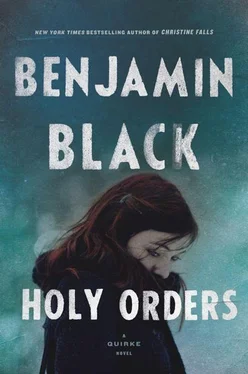“There must be developments. There’s always developments. Even if there’s not, the cops pretend there are. What do they say? ‘Following a definite line of inquiry.’ Get onto that detective, what’s-he-called, and make him give you something. If he says he has nothing, invent it yourself—‘love tangle clue to killing,’ ‘mystery woman seen in vicinity of the crime,’ that kind of thing.”
“But…”
“But what?”
Harry heard himself swallow. “It’s not really … We can’t just…”
“Why not?” Sumner’s mustache was twitching again. Was he trying not to laugh? The missus was right, Harry had to acknowledge it: Sumner was no newspaper man. He was just amusing himself here, making Harry peel the potato peelings. Harry shifted in his chair.
“We can’t just invent things, Mr. Sumner. I mean, there’s a limit.”
Sumner, gazing at him, slowly shook his head. “That’s where you’re wrong, Harry,” he said, in almost a kindly, almost an avuncular tone. “There are no limits, except the ones you impose on yourself. That’s a thing I’ve learned from a lifetime in business. There’s no limits, there’s no line that can’t be crossed. You take a risk? Sure you take a risk. Otherwise you’re not in the game at all.” He stubbed the remains of his cheroot in the ashtray on the desk and got to his feet, brushing his hands together. “The mystery woman,” he said. “That’s the line to follow.”
“But—”
“There you go again,” he said, smiling genially, “butting the buts.” He winked. “ Cherchez la femme —there’s always a broad, Harry, always.” He began to turn aside but a thought struck him and he stopped. “He wasn’t queer, was he, our little Jimmy Brown?”
Harry was about to reply, but paused. Here was a way, maybe, to get Sumner to back off. No paper was going to splash a story if it involved a nancy boy getting done in. Even Sumner would know that. “We’ve no reason to think he was that way inclined,” Harry said carefully. “On the other hand—”
“Good,” Sumner said briskly. “Let’s get going, then.”
Harry’s spirits sank. No good resisting; Sumner would not be deterred.
“There was a woman there, that night,” Harry said, tentatively.
“Oh, yes? Who was she?”
“Secretary, lived nearby. She was the one that found the body.”
Sumner showed his teeth again in a big, benign smile. “See?” he said. “I told you: there’s always a broad.”
“Trouble is, she was with someone. Her boss.”
“Her boss? Wasn’t it the middle of the night when the corpse was found? What the hell was this secretary doing with her boss at that hour”—he laughed coarsely—“taking dictation?”
Harry shrugged. “I don’t think we can call her a mystery woman.”
“Sure you can! Or make the boss a mystery man. ‘RIDDLE OF COUPLE ON RIVERBANK.’ It’s perfect.”
“The thing is—”
Sumner made a sudden lunge forward, planting his big hands on the desk in front of Harry and looming at him menacingly. Harry could smell the lingering mundungus stink of his breath.
“Harry, look,” Sumner said. “Do this — do it for me, if you like. Find the girl, talk to her, talk to her boss—”
“He won’t—”
“He will. You’ll make him talk. I bet he has a wife, and if he has I bet she didn’t know about little Miss Secretary being out with him for a midnight stroll and stumbling on a body and the cops coming and taking down her particulars — yes? All anybody needs is a little persuasion, Harry. Lean a little on the two of them and they’ll sing like songbirds.” He smiled, those white teeth genially agleam. “You’ll see — you’ll see I’m right.” He straightened, and turned and went to the door, then paused again. “You know,” he said thoughtfully, glancing up at a corner of the ceiling, “I’m really getting to like this business. I should have gone into newspapers years ago.”
He nodded then, and went out, whistling. Harry sat for a long time gazing stonily at the door. “Noospapers,” he said, with deep disgust, spitting out the word.
McGonagle’s had a new barman, a cocky young fellow with a quiff. His name was Frankie—“like Frankie Sinatra,” as he was fond of telling anyone who would listen. He was all energy, diving and dashing about behind the bar like an acrobat, tossing tumblers from hand to hand and operating the beer pulls with a fancy flick of the wrist. He had a smart mouth, and made wisecracks, addressing the older customers facetiously as Your Honor, or Squire, or Captain, depending on what he thought they looked like. More than one of the regulars had complained about him to Paschal, the manager, but Paschal had told them to have a heart, that Frankie was only a young fellow and would soon settle down. Quirke, however, was inclined not to have a heart in the matter of Frankie, for he did not like the look of him at all, and not just the look of him, either. Quirke scowled when he came near. He found particularly irritating the way the young man had of throwing up his chin and yanking his fake bow tie to the end of its elastic and letting it snap back with a sharp smack. No, as far as Quirke was concerned, Frankie was exactly what McGonagle’s did not need.
Quirke had been in an irritable mood even before he arrived at the pub, having been caught in yet another shower of rain on his way up Grafton Street, and the sight of Frankie’s cheeky grin set his teeth on a sharper edge. He ordered a glass of whiskey, and when Frankie asked if he wanted ice in it — ice, in a Jameson! — he gave back such a look that Frankie quailed, and only said right-oh, and skidded off to fetch the order.
This evening Quirke had even more things than the rain and Frankie to annoy him. For a start, Isabel Galloway was coming back — in fact, she was back already, her tour having ended the previous night. She had telephoned from the railway station in Mullingar to say her train would be in by six, but that she was tired, having been up till dawn at the last-night party—“To tell you the truth, darling, I think I’m still a bit squiffy”—and would go to bed for a few hours, and see him later. He was surprised at how his heart sank when he heard her voice and realized her return was imminent. Isabel, he reminded himself again, was a splendid woman in many ways, yet he could not deny that he had found the weeks of her absence restful and undemanding. This made him feel guilty, of course, and now he felt guiltier still as he settled down to savor his last few hours of what he could not but think of as freedom.
He spotted Hackett as soon as the detective came in the door. He had his hat on, and the shoulders of his gabardine raincoat were splashed with rain.
“That’s a soft evening,” Hackett said, settling himself on the stool next to Quirke’s. He had struggled out of his raincoat and now he folded it on his knees and set his hat on the bar beside his elbow.
“What will you have?” Quirke asked.
“A small port.”
Quirke stared. “A what?”
“A small port,” Hackett said again, unruffled. “If it’s all right with you.”
“Sure. Certainly.” There was a pause. “Since when did you become a port drinker?”
“I take a glass sometimes. It’s very calming. You should try it.”
Quirke lifted a finger to Frankie. “A glass of port for my friend here.” He shook his head, watching as the young man took down the dusty bottle of Graham’s from a high shelf. “I suppose next it’ll be Wincarnis tonic wine.”
“You may mock,” Hackett said complacently. “It doesn’t trouble me.” He glanced at Quirke’s tie of blue and white stripes. “You’re not wearing it today, I see.”
Читать дальше












